Eintracht Frankfurt is a professional football club following the merger of two clubs that were formed in March 1899, and are based in the city of Frankfurt in the German state of Hesse.
Frankfurter Fußball-Club Viktoria von 1899 and Frankfurter Fußball-Club Kickers von 1899 were both founder members of the Nordkreis-Liga in 1909.
The two clubs merged in May 2011 to form Frankfurter Fußball Verein (Kickers-Viktoria).
In 1927, the gymnastic department of the club went its separate way, two years after football commenced at Waldstadion. Eintracht collected the Kreisliga Nordmain title in 1919-20 and 1920-21 as well as the Bezirksliga Main-Hessen in 1927-28, 1928-29, 1929-30, 1930-31 and 1931-32.
Those triumphs allowed the club to compete for the South German championship, which was won in 1929-30 and 1931-32. The final triumph saw Eintracht go all the way to the national final, before going down 2-0 to FC Bayern München in front of a crowd of 55,000 at the Städtisches Stadion in Nuremberg, as the Bavarian giants lifted their first national title.
In 1933, German football was divided into sixteen top-flight regional Gauligas under the Third Reich. Eintracht played in the Gauliga Südwest and went on to win the title in 1937-38. Following World War II, the club established itself in the Oberliga Süd, one of five top-level divisions.
‘Die Adler’ lifted the title in 1952-53 and 1958-59. The latter triumph led to the team being crowned as German champions for the first time as local rivals Kickers Offenbach were defeated 5-3 at Berlin’s Olimpiastadion in front of 75,000 fans thanks to an Eckehard Feigenspan hat-trick and a brace from István Sztáni.
The following season, Eintracht overcame Young Boys, Wiener Sportclub and Rangers in the European Cup to set up a final against Real Madrid at Hampden Park. The Spaniards won the game 7-3, with the action available to view here.
Erwin Stein netted twice, with Richard Kress scoring the other goal for the German champions. Eintracht Frankfurt were selected as one of the sixteen founder members of the Bundesliga for the 1963-64 season. The team played for the next thirty-three seasons in the top level of German football.
The club provided Jürgen Grabowski, Hans Tilkowski and Friedel Lutz to the West Germany World Cup squad of 1966, before the team reached the semi-final of the European Inter-Cities Fair Cup in 1966-67 before going out to Dinamo Zagreb.
In 1973-74, Eintracht lifted the national cup DFB Pokal after defeating Hamburger SV 3-1 after extra time at the newly opened Rheinstadion in Düsseldorf, with the goals coming from Gert Trinklein, Bernd Hölzenbein and Wolfgang Kraus. The team retained the cup the following season with a 1-0 win against MSV Duisburg at the Niedersachsenstadion in Hanover.
Karl-Heinz Körbel scored the only goal. Further third-place league finishes and their Pokal successes ensured more adventures in European competition. In 1975-76, the side bowed out in the semi-finals to West Ham United, before going on to win the UEFA Cup in 1979-80.
Aberdeen, Dinamo București, Feyenoord, Zbrojovka Brno and Bayern München were defeated before Eintracht won the final on away goals after the tie with Borussia Mönchengladbach, as Harald Karger, Hölzenbein, and Fred Schaub weighed in with the goals.
Körbel became the record club appearance holder between 1972 and 1991.
He picked up two more Pokal winners medals, in 1980-81, after Eintracht’s 3-1 win against 1. FC Kaiserslautern in Stuttgart as Willi Neuberger, Ronald Borchers and Cha-Bum-kun scoring.
In 1987-88, VfL Bochum were beaten at the Olimpiastadion in Berlin in front of a crowd of 76,000 as Lajos Détári scored the only goal of the game.
Eintracht kept their top-flight status in 1983-84 and 1988-89 following play-off victories over MSV Duisburg and 1. FC Saarbrücken. However, the team were relegated in 1995-96 after top scorer Tony Yeboah had moved on. Eintracht returned to the top flight as 2. Bundesliga champions in 1997-98.
The goals of Thomas Sobotzik helped the side, as Horst Ehrmantraut trained them. However, after two seasons of struggle and financial problems under different spells as chief trainer from Reinhold Fanz, Jörg Berger, Felix Magath and then Friedel Rausch, the team went back down to the second tier in 2000-01.
The goals of Paweł Kryszałowicz cheered the Waldstadion faithful before promotion was secured in 2002-03 with Willi Reimann in charge after the team followed a term from Martin Andermatt. The team would only remain at the top level for twelve months before they were demoted once again.
In true Eintracht fashion, the team won promotion at the first attempt as the goals of Arie van Lent proved pivotal in 2004-05 for Friedhelm Funkel's side. He continued to steady the ship and led his team to a mid-table finish in 2007-08 as Ioannis Amanatidis captained the side. Funkel resigned in May 2009 and was replaced by Michael Skibbe.
He, in turn, made way for Christoph Daum in March 2011, who couldn’t save the team from relegation. Armin Veh arrived as the new head coach for the 2011-12 season, as he took the team to promotion as runners-up. The team finished in sixth place in the Bundesliga in 2012-13; the club's best finish for many years.
Thomas Schaaf took over looking after the team when Veh’s contract expired in June 2014. The former boss returned for a second spell before he was replaced by Niko Kovač in March 2016 as Eintracht stayed up with a 2-1 aggregate win against 1. FC Nürnberg in the relegation play-off.
The 2016-17
campaign ended in an eleventh-place finish with Alexander Meier captaining the
team. The DFB Pokal was lifted in 2017-18 after Bayern München were defeated
3-1 thanks to a brace from Ante Rebić and another goal from Mijat Gaćinović as David
Abraham captained the team.
Adi Hütter took over as coach for the 2018-19 campaign, which saw a run in the Europa League after winning the group before further knockout wins against Shakhtar Donetsk, Internazionale and SL Benfica. Chelsea ended hopes of glory in the semi-finals with Makoto Hasebe and Filip Kostić scoring throughout.
Domestically, the team ended in seventh place, which was enough for another Europa League
place as the stadium changed sponsorship title to Deutsche Bank Park. Again, Frankfurt got through the group stages, while in the 2019-20 Bundesliga
campaign, the side struggled to ninth place.
The 2021-22 season saw Eintracht appoint Oliver Glasner and go on to defeat West Ham United to avenge a previous semi-final defeat to reach the final of the Europa League. The match at Seville's Estadio Ramón Sánchez-Pizjuán ended 1-1 with Rafael Borré netting, before Frankfurt won 5-4 on penalties.
The team lost 2-0 to RB Leipzig in the final of the 2022-23 final of DFB-Pokal before Dino Toppmöller was given the job as chief trainer, taking the side to sixth place, and then third in 2024-25 thanks to the goals of Omar Mamoush and Hugo Ekitiké.
Eintracht Frankfurt will play in the Bundesliga in the 2025-26 season.
My visit
Eintracht Frankfurt 2 Borussia 09 Dortmund 2 (Saturday 21st October 2017) Bundesliga (att: 51,500)
Once in a while, I spend more than I usually would on going to a match if it’s somewhere I really want to go. Sometimes I regret it, but on other occasions it’s worth every penny, with this being one such occasion while in Frankfurt, using it as an excellent base for a long weekend of beer and football.
I’d left the Regionalliga match between FSV Frankfurt and KSV Hessen Kassel at half time to ensure that I reached the Commerzbank Arena without any panic, changing from the U7 at Konstablerwache before catching the S8 train to Stadion.
I’d been past the stadium, both on arriving in the city the previous day and on my journey to and from Wiesbaden, so I had an idea of the layout and distances involved. The usual excellent German public transport was constantly ferrying fans to the area.
Flughafenstraße was a narrow road from the Stadion station all the way to the stadium, with several stalls selling food and beer along the route, along with plenty of souvenir stands. It was busy, without being too restricted. Some fans took shortcuts, cutting through the edge of the forest.
While I was keen for a beer and another snack to keep me going until after the game, I was also eager to get through the gates and inside the complex. I bought a large frikadel with onions for €4.40 just outside. The entrances were set back from the structure, with access to most areas around the open concourse once inside.
The queues were quickly negotiated, and I walked up the slope to discover and find my block.
It was immediately obvious that a lot of Dortmund fans had travelled, with the likelihood that many would be in the traditional home areas. This was quite normal in Germany, once the designated visiting area had been sold out.
There were only a few hundred places left when I purchased my online ticket for €56. I printed it out before I set out, as well as an extra sheet, which gave me free travel from 11am until 4am the following morning
I purchased a thick A4 club magazine for €2, which came with a small free match programme, before deciding to try the local applewein, which I’d read about. It was like flat cider and cost €4.30 for a large plastic glass.
My seat was in block 15H in the Osttribune. I knew I’d selected somewhere near the back, but I didn’t realise just how far. The steps were steep, and I was a couple of rows from the rear. After initially mixing up my row and seat number, I found my correct place.
Like many German stadia, the Commerzbank Arena had the back row seats taken out, so there was a small standing area. Because my seat was in the middle of a row and hemmed in, I decided to just go to the very back. It gave me an amazing view.
The arena was two-tiered, with a business deck dividing the levels, not unlike a smaller version of Wembley. A roof covered every place, with a scoreboard hanging over the halfway line. Paul Robinson hit the scoreboard during the World Cup in 2006. It was so high that I could only conclude that he’d done it for some sort of bet or dare.
It showed highlights and club material as the teams warmed up. The Westtribune had terracing on the lower level for the home fans. The visitors also had a section for standing in the corner below me to the left. Both sets of fans were creating a tremendous atmosphere in the lead-up to the game. Thousands more Dortmund fans were indeed all around me.
If I was impressed by the stadium and atmosphere, I really hadn’t prepared for just what a superb game I was about to watch. It really was right up there with anything I’d seen before, thanks to both sides' attacking intent. The action started right from the off, with neither side holding back.
Eintracht’s players impressed me with their clever runs to get through the Borussia rearguard. I thought Ante Rebic was absolutely superb. It looked like he’d open the scoring after seventeen minutes, only to have the goal chalked off for offside. Dortmund took full advantage just a minute later when Marc Bartra fired in a low cross shot, which was converted by Nuri Sahin.
The swathes of yellow and black support were ecstatic as Peter Bosz’s league leaders looked to extend their lead at the top. Marius Wolf nearly levelled things up, but he was denied by visiting keeper Roman Burki before Sébastien Haller came close. Dortmund’s defence had a bit of a makeshift look as the team had been hit by injuries.
Eintracht continued to probe and find their way through, without scoring. They suffered a blow of their own when striker Timothy Chandler was forced off with an injury. Pierre-Emerick Aubameyang missed a good opportunity to double the BVB lead before the half-time whistle as he fired wide after Christian Pulisic had knocked the ball down into his path.
I’d seen the effort from the gate, as I was poised to beat the crowds and grab another cider. I retook my place at the back and reflected on what a good, friendly, but passionate atmosphere was created, despite opposing fans sitting alongside each other. Aubameyang shot wide just after the restart, much to the exasperation of the away fans, before he had an effort saved by Frankfurt’s goalie, Lukas Hradecky.
However, it was soon to be 2-0 as Maximilian Philipp finished with style after Mario Gotze supplied a pass. I felt slightly disappointed. I wasn’t too fussed who won, but I’d hoped for a close game, and was worried that it would peter out after Dortmund extended their advantage. It nearly became 3-0, but Aubameyang had a goal disallowed for offside.
Despite the score, Eintracht had continued to press forward. It did, however, seem difficult to imagine how they’d get back into the contest. In the sixty-fourth minute, I was to get my answer as Burki clumsily fouled Rebic. Haller scored from the penalty spot. Play continued to go from end to end. Hradecky pulled off a superb stop to keep out a Pulisic effort.
Wolf then found space before firing past Burki to make it 2-2 after being set up by Mijat Gaćinović. The noise inside the stadium was incredible and matched the show on the pitch.
From nowhere, I thought that Eintracht would go on to win the game. Chances and attacks were still coming, with Gotze probing. Burki made a great save to keep out Haller, as I headed downstairs and found a vantage spot at a gate in the business section.
In stoppage time, Dortmund nearly clinched a winner as Makoto Hasebe worked wonders to clear a volley from Sahin off the line. The whistle was blown by referee Robert Hartmann shortly after to conclude a magnificent game of football.
As soon as the game ended, I was on my way along the paths at the other side of the complex to my arrival to jump on a 21 tram at Stadion Straßenbahn. It took me all the way to Frankfurt Hauptbahnhof, where I knew I could catch the number 11 service to my hotel.
My day got better as the service pulled in a minute later. The mobile phone signal had been poor at the stadium, and I was catching up on scores from elsewhere. Unfortunately, I didn’t realise that we were travelling in the wrong direction for several stops.
Eventually, I got back to the Golden Leaf Hotel & Residence to have a quick nap and to freshen up. I wasn’t finished with my brilliant day out. Unfortunately, a train was cancelled at Ost station, so I went downstairs to the U-Bahn and eventually arrived over the River Main at Lokalbanhof. I’d read about a lively area for bars between Affentorplatz and Dreieichstraße.
I was keen to take a look. I’d been advised to try and visit a pub called Klapper 33. It looked absolutely packed, but I decided to give it a go. I’m glad that I did. It was full of people having fun and celebrating Eintracht’s performance.
A DJ played plenty of rock and local punk tracks, which did the trick with the customers. The service was excellent despite the crowds. I’d only popped in for a look, but ended up staying for five large beers; the last of which was the excellent Frankenheim Alt dark beer from Düsseldorf.
I had another beer next door in the relatively underwhelming Legends Music Bar, before taking a train back across town to Konstablewache for a visit to a pub I’d seen earlier in the day. The Birmingham Pub was a decent choice. The establishment was very German and served decent drinks at a fair price.
I sampled another applewein, which shocked the staff as I didn’t want it diluted in any way. The pub also had the bonus of an adjoining Imbiss, basically a snack bar facing the street, specialising in takeaway food. The currywurst and fries were a perfect way to end a brilliant day, before I walked the twenty minutes or so back home. I didn’t require any rocking!

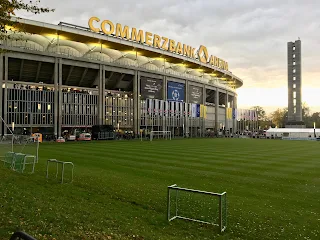




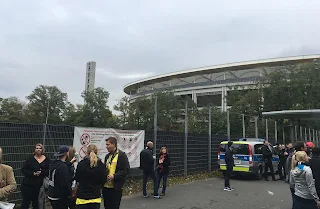


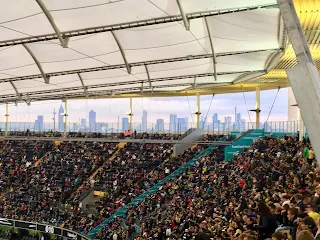





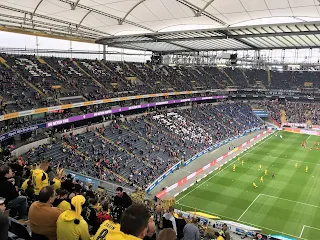



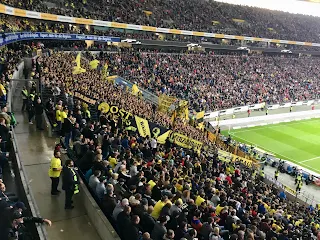




No comments:
Post a Comment